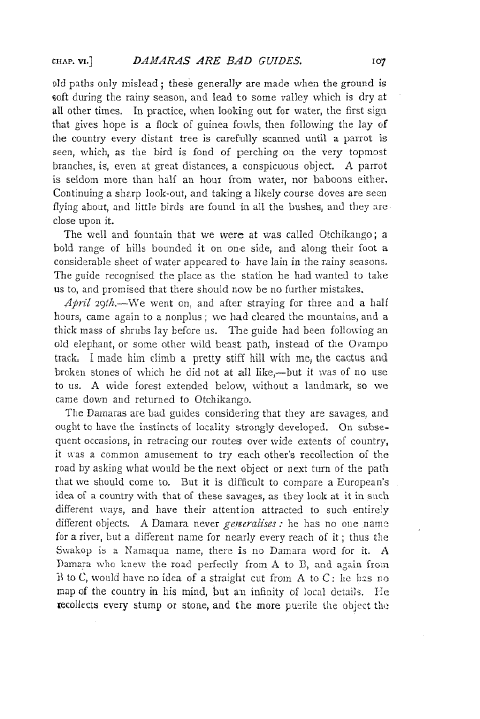CHAP. vl.] DAMARAS ARE BAD GUIDES. 107
old paths only mislead; these generally are made when the ground is soft during the rainy season, and lead to some valley which is dry at all other times. In practice, when looking out for water, the first sign that gives hope is a flock of guinea fowls, then following the lay of the country every distant tree is carefully scanned until a parrot is seen, which, as the bird is fond of perching on the very topmost branches, is, even at great distances, a conspicuous object. A parrot is seldom more than half an hour from water, nor baboons either. Continuing a sharp look-out, and taking a likely course doves are seen flying about, and little birds are found in all the bushes, and they are close upon it.
The well and fountain that we were at was called Otchikango; a bold range of hills bounded it on one side, and along their foot a considerable sheet of water appeared to have lain in the rainy seasons. The guide recognised the place as the station he had wanted to take us to, and promised that there should now be no further mistakes.
April 29th.-We went on, and after straying for three and a half hours, came again to a nonplus ; we had cleared the mountains, and a thick mass of shrubs lay before us. The guide had been following an old elephant, or some other wild beast path, instead of the Ovampo track. I made him climb a pretty stiff hill with me, the cactus and broken stones of which he did not at all like,-but it was of no use to us. A wide forest extended below, without a landmark, so we came down and returned to Otchikango.
The Damaras are bad guides considering that they are savages, and ought to have the instincts of locality strongly developed. On subsequent occasions, in retracing our routes over wide extents of country, it was a common amusement to try each other's recollection of the road by asking what would be the next object or next turn of the path that we should come to. But it is difficult to compare a European's idea of a country with that of these savages, as they look at it in such different ways, and have their attention attracted to such entirely different objects. A Damara never generalises: he has no one name for a river, but a different name for nearly every reach of it ; thus the Swakop is a Namaqua name, there is no Damara word for it. A Damara who knew the road perfectly from A to B, and again froin it to C, would have no idea of a straight cut from A to C: lie l:as no map of the country in his mind, but an infinity of local details. Ile recollects every stump or stone, and the more puOrile the object the

